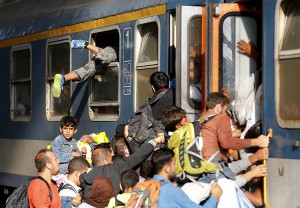Crisis in Budapest
September 3, 2015
Over the past several years, the European Union (EU) has been faced with a growing problem—a trickle of migrants and refugees has become a flood of people trying to gain entry to EU nations. This week, the problem became acute in Budapest, Hungary.

Refugees storm a train at the Keleti train station in Budapest, Hungary, on September 3. After two days of blocking entrance to the station, Hungarian police began allowing refugees in again. (Credit: © Laszlo Balogh, Reuters/Landov)
According to the United Nations (UN), migrants are people seeking to live in a new country for economic reasons. They are from poor nations and believe they will have a better standard of living in a wealthier nation. Refugees are people fleeing to a new country because of dangerous conditions in their own nation. Such conditions may include war; famine; or persecution based on religion, nationality, or political or other beliefs.
Many migrants, often from African nations, arrive by sea in dangerous ships not fit to use as transportation. Greece and Italy have been frequent destinations for migrants, and both southern coastal nations have been hard-pressed to mount rescues for those who encounter difficulties on their journey. In 2015 alone, more than 2,000 migrants have died crossing the Mediterranean Sea in an attempt to reach Europe.
Refugees from Syria and other war-torn regions of the Middle East also take a dangerous sea journey. After their arrival in Greece, they tend to travel overland to Macedonia, through Serbia and Hungary, hoping to arrive in Germany. Thus far in 2015, nearly 500,000 people have entered Europe hoping to find a new home. It is the greatest movement of refugees in Europe since World War II (1939-1945).
On Tuesday, September 1, the lives of many mostly Syrian refugees became even harder when the nation of Hungary closed its train station in Budapest and refused to allow refugees to board trains for their final destination countries of Austria and Germany. The government of Hungary’s Prime Minister Viktor Orban cited EU rules that state that refugees must be issued documents upon their arrival in Europe by the nation in which they landed. Orban claimed all refugees must be documented by Hungary before traveling on to Germany.
The scene in and outside the Keleti train station in Budapest was one of chaos. For the first two days, the train station was closed to refugees. Some 2,000 refugees slept outside the train station with no shelter or toilets. As of this morning, the station was reopened to the Syrians, although they are still not allowed to travel on trains out of Budapest. Even with the station as a shelter, services for many people are not available from the Hungarian government.


